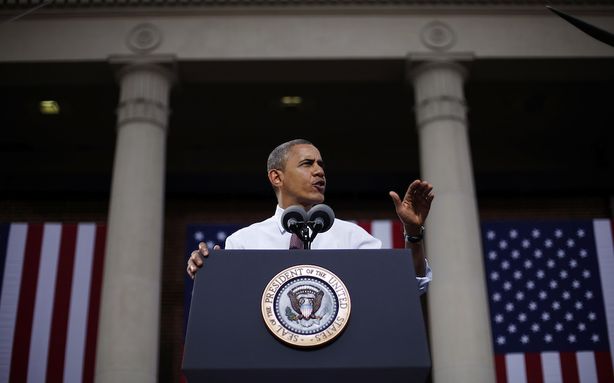EDITORIAL
Barack Obama for Re-election
Published: October 27, 2012 713 Comments
The economy is slowly recovering from the 2008 meltdown, and the country could suffer another recession if the wrong policies take hold. The United States is embroiled in unstable regions that could easily explode into full-blown disaster. An ideological assault from the right has started to undermine the vital health reform law passed in 2010. Those forces are eroding women’s access to health care, and their right to control their lives. Nearly 50 years after passage of the Civil Rights Act, all Americans’ rights are cheapened by the right wing’s determination to deny marriage benefits to a selected group of us. Astonishingly, even the very right to vote is being challenged.
That is the context for the Nov. 6 election, and as stark as it is, the choice is just as clear.
President Obama has shown a firm commitment to using government to help foster growth. He has formed sensible budget policies that are not dedicated to protecting the powerful, and has worked to save the social safety net to protect the powerless. Mr. Obama has impressive achievements despite the implacable wall of refusal erected by Congressional Republicans so intent on stopping him that they risked pushing the nation into depression, held its credit rating hostage, and hobbled economic recovery.
Mitt Romney, the former governor of Massachusetts, has gotten this far with a guile that allows him to say whatever he thinks an audience wants to hear. But he has tied himself to the ultraconservative forces that control the Republican Party and embraced their policies, including reckless budget cuts and 30-year-old, discredited trickle-down ideas. Voters may still be confused about Mr. Romney’s true identity, but they know the Republican Party, and a Romney administration would reflect its agenda. Mr. Romney’s choice of Representative Paul Ryan as his running mate says volumes about that.
We have criticized individual policy choices that Mr. Obama has made over the last four years, and have been impatient with his unwillingness to throw himself into the political fight. But he has shaken off the hesitancy that cost him the first debate, and he approaches the election clearly ready for the partisan battles that would follow his victory.
We are confident he would challenge the Republicans in the “fiscal cliff” battle even if it meant calling their bluff, letting the Bush tax cuts expire and forcing them to confront the budget sequester they created. Electing Mr. Romney would eliminate any hope of deficit reduction that included increased revenues.
In the poisonous atmosphere of this campaign, it may be easy to overlook Mr. Obama’s many important achievements, including carrying out the economic stimulus, saving the auto industry, improving fuel efficiency standards, and making two very fine Supreme Court appointments.
Health Care
Mr. Obama has achieved the most sweeping health care reforms since the passage of Medicare and Medicaid in 1965. The reform law takes a big step toward universal health coverage, a final piece in the social contract.
It was astonishing that Mr. Obama and the Democrats in Congress were able to get a bill past the Republican opposition. But the Republicans’ propagandistic distortions of the new law helped them wrest back control of the House, and they are determined now to repeal the law.
That would eliminate the many benefits the reform has already brought: allowing children under 26 to stay on their parents’ policies; lower drug costs for people on Medicare who are heavy users of prescription drugs; free immunizations, mammograms and contraceptives; a ban on lifetime limits on insurance payments. Insurance companies cannot deny coverage to children with pre-existing conditions. Starting in 2014, insurers must accept all applicants. Once fully in effect, the new law would start to control health care costs.
Mr. Romney has no plan for covering the uninsured beyond his callous assumption that they will use emergency rooms. He wants to use voucher programs to shift more Medicare costs to beneficiaries and block grants to shift more Medicaid costs to the states.
The Economy
Mr. Obama prevented another Great Depression. The economy was cratering when he took office in January 2009. By that June it was growing, and it has been ever since (although at a rate that disappoints everyone), thanks in large part to interventions Mr. Obama championed, like the $840 billion stimulus bill. Republicans say it failed, but it created and preserved 2.5 million jobs and prevented unemployment from reaching 12 percent. Poverty would have been much worse without the billions spent on Medicaid, food stamps and jobless benefits.
Last year, Mr. Obama introduced a jobs plan that included spending on school renovations, repair projects for roads and bridges, aid to states, and more. It was stymied by Republicans. Contrary to Mr. Romney’s claims, Mr. Obama has done good things for small businesses — like pushing through more tax write-offs for new equipment and temporary tax cuts for hiring the unemployed.
The Dodd-Frank financial regulation was an important milestone. It is still a work in progress, but it established the Consumer Financial Protection Bureau, initiated reform of the derivatives market, and imposed higher capital requirements for banks. Mr. Romney wants to repeal it.
If re-elected, Mr. Obama would be in position to shape the “grand bargain” that could finally combine stimulus like the jobs bill with long-term deficit reduction that includes letting the high-end Bush-era tax cuts expire. Stimulus should come first, and deficit reduction as the economy strengthens. Mr. Obama has not been as aggressive as we would have liked in addressing the housing crisis, but he has increased efforts in refinancing and loan modifications.
Mr. Romney’s economic plan, as much as we know about it, is regressive, relying on big tax cuts and deregulation. That kind of plan was not the answer after the financial crisis, and it will not create broad prosperity.
Foreign Affairs
Mr. Obama and his administration have been resolute in attacking Al Qaeda’s leadership, including the killing of Osama bin Laden. He has ended the war in Iraq. Mr. Romney, however, has said he would have insisted on leaving thousands of American soldiers there. He has surrounded himself with Bush administration neocons who helped to engineer the Iraq war, and adopted their militaristic talk in a way that makes a Romney administration’s foreign policies a frightening prospect.
Mr. Obama negotiated a much tougher regime of multilateral economic sanctions on Iran. Mr. Romney likes to say the president was ineffective on Iran, but at the final debate he agreed with Mr. Obama’s policies. Mr. Obama deserves credit for his handling of the Arab Spring. The killing goes on in Syria, but the administration is working to identify and support moderate insurgent forces there. At the last debate, Mr. Romney talked about funneling arms through Saudi Arabia and Qatar, which are funneling arms to jihadist groups.
Mr. Obama gathered international backing for airstrikes during the Libyan uprising, and kept American military forces in a background role. It was smart policy.
In the broadest terms, he introduced a measure of military restraint after the Bush years and helped repair America’s badly damaged reputation in many countries from the low levels to which it had sunk by 2008.
The Supreme Court
The future of the nation’s highest court hangs in the balance in this election — and along with it, reproductive freedom for American women and voting rights for all, to name just two issues. Whoever is president after the election will make at least one appointment to the court, and many more to federal appeals courts and district courts.
Mr. Obama, who appointed the impressive Justices Elena Kagan and Sonia Sotomayor, understands how severely damaging conservative activism has been in areas like campaign spending. He would appoint justices and judges who understand that landmarks of equality like the Voting Rights Act must be defended against the steady attack from the right.
Mr. Romney’s campaign Web site says he will “nominate judges in the mold of Chief Justice Roberts and Justices Scalia, Thomas and Alito,” among the most conservative justices in the past 75 years. There is no doubt that he would appoint justices who would seek to overturn Roe v. Wade.
Civil Rights
The extraordinary fact of Mr. Obama’s 2008 election did not usher in a new post-racial era. In fact, the steady undercurrent of racism in national politics is truly disturbing. Mr. Obama, however, has reversed Bush administration policies that chipped away at minorities’ voting rights and has fought laws, like the ones in Arizona, that seek to turn undocumented immigrants into a class of criminals.
The military’s odious “don’t ask, don’t tell” rule was finally legislated out of existence, under the Obama administration’s leadership. There are still big hurdles to equality to be brought down, including the Defense of Marriage Act, the outrageous federal law that undermines the rights of gay men and lesbians, even in states that recognize those rights.
Though it took Mr. Obama some time to do it, he overcame his hesitation about same-sex marriage and declared his support. That support has helped spur marriage-equality movements around the country. His Justice Department has also stopped defending the Defense of Marriage Act against constitutional challenges.
Mr. Romney opposes same-sex marriage and supports the federal act, which not only denies federal benefits and recognition to same-sex couples but allows states to ignore marriages made in other states. His campaign declared that Mr. Romney would not object if states also banned adoption by same-sex couples and restricted their rights to hospital visitation and other privileges.
Mr. Romney has been careful to avoid the efforts of some Republicans to criminalize abortion even in the case of women who had been raped, including by family members. He says he is not opposed to contraception, but he has promised to deny federal money to Planned Parenthood, on which millions of women depend for family planning.
For these and many other reasons, we enthusiastically endorse President Barack Obama for a second term, and express the hope that his victory will be accompanied by a new Congress willing to work for policies that Americans need.





